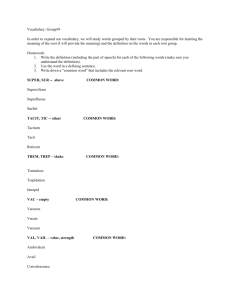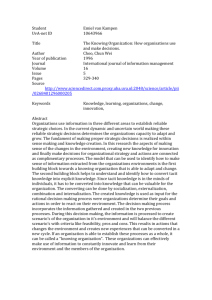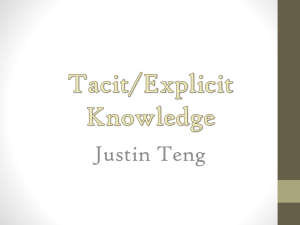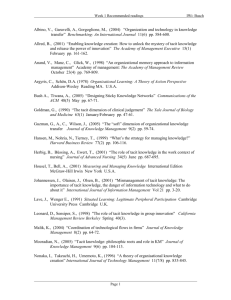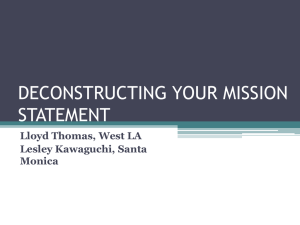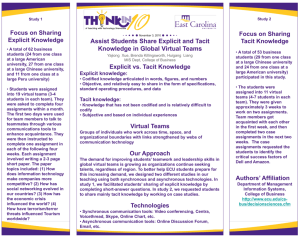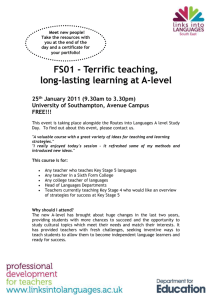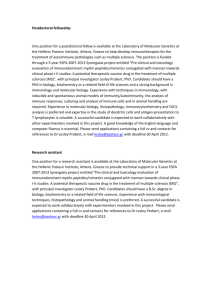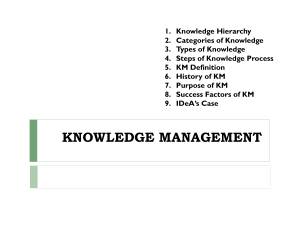Smart Knowledge Sharing
advertisement
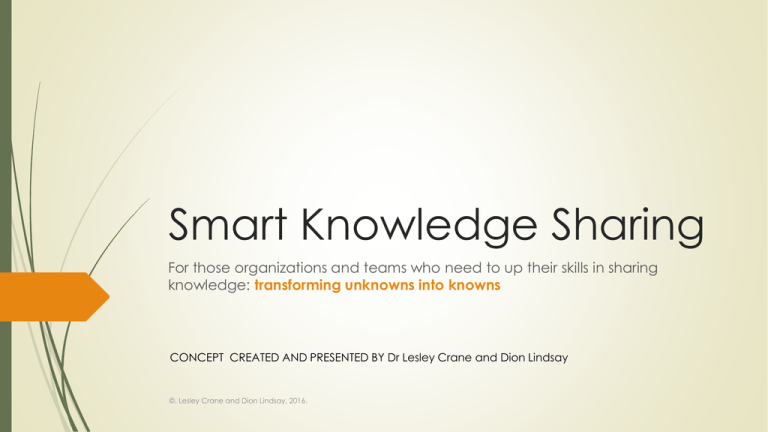
Smart Knowledge Sharing For those organizations and teams who need to up their skills in sharing knowledge: transforming unknowns into knowns CONCEPT CREATED AND PRESENTED BY Dr Lesley Crane and Dion Lindsay ©. Lesley Crane and Dion Lindsay, 2016. About the authors Lesley Crane PhD, MA, BSc Hons Lesley is a consultant and author specialising in organizational change through effective learning and knowledge sharing. She is committed to designing and implementing solutions which allow and motivate people to achieve their real potential through effective learning and knowledge sharing. As a learning specialist, her track record and background combines the commercial world and academia. She has experience working in a range of diverse sectors including local and national government, energy, environment, heritage, aerospace and defence, and education, affording a broad spectrum of insights. Added to this, Lesley has a growing number of publications in organizational science journals and management publications. Her first book was published in 2015, with a second due out 2016. Lesley also serves as an official reviewer for the Journal of Knowledge Management, amongst others, and contributes to international conferences as a speaker on the topics of learning, knowledge management and change. Dion Lindsay Dion is an experienced knowledge and information management consultant and trainer. Typically, his clients are committed to strategic change and/or rapid growth. He designs techniques and strategies for mobilising an enterprise's knowledge and information, collaborative working and social media. He possesses a detailed understanding of how these are being used across all sectors and a keen sense of what works. Many of his current clients are intranet managements and libraries developing their KM and IM potential. Dion particularly excels in designing strategies which have bite and relevance, from strategic planning and programme leadership, to inhouse education and training, coaching and public master classes. His "Best Practices in Social Media Governance" is published Ark Group. Setting the scene • Innovation and disruption now critical in a landscape of unprecedented change and opportunity. • In this complex landscape, knowledge sharing is fundamental to effective performance, values and sustainable achievement. • Sharing knowledge may be ‘baked into’ human DNA, but plenty evidence suggests that knowledge sharing is far from ‘baked into’ the business. • How can knowledge sharing be made more effective? • Developing a strategy for effective knowledge sharing is, of course, contingent to individual contexts and circumstances - but there is one common issue: People know far more than they know that they know. How can people share what they don’t know that they know? How does it work? Here’s the science bit…5:95 • Research in the neurosciences supports the view that you are consciously aware of your actions only 5% of the average day. • This suggests that 95% of what you know – what you act on - is not normally or easily available to conscious awareness. • Conventional strategies and practices in organizational knowledge sharing mostly only directly address, capture, codify and distribute a fraction of actual knowledge. • The rest remains unavailable and unshared. • But, research in cognitive psychology – evidenced in the findings of Lesley’s research spread over 5 years supports the claim that this kind of knowledge – tacit knowing – influences what we do, what we think and how we behave. Tacit knowing makes explicit knowing and knowledge actionable. 5:95 – how is this? • Human consciousness is limited: • We can only cope with so much cognitive load at any given time – what used to be called the ‘magic 7 +/- 2 rule’; • Working memory is – let’s face it – pretty limited if we can’t retain more than between 5 to 9 things in our heads at any one time! • Consequently, the human ability to unconsciously (implicitly) learn through assimilating information from the environment - without awareness - is critical to normal everyday action and functioning – making sense of the world. • If you had to rely on conscious awareness all of the time, you’d probably never get out of bed! Tacit knowing provides the ‘code’ to make explicit knowledge actionable, and to make sense of the world. This is what we’re talking about • Recognition moments…. We’ve all had them – a moment when you suddenly realise that you already know something that someone is telling you, or while you’re reading a book, for instance. But you didn’t know that you knew! Often called ‘déjà vu’, these are moments when something triggers connection to tacit knowing, bringing previously unacknowledged knowledge into conscious thought. That is one of the reasons why social proximity is important to smart knowledge sharing. It also underlines the importance of both social context and relationships. So now you know, does it matter? Why it matters • In the course of their work and practice, people acquire a vast amount of tacit knowledge. • Some of this is concerned with everyday mundane activities. • But a great deal is specific to their work. The source of their expertise and value to the business. • If asked to describe what they do in their work, this is not the kind of stuff that will readily come to mind. • But, by paying attention to – by analysing – what people say, we can directly see how people think, and how they make sense of their world. Their tacit knowing. External stimuli can act like a magnet for tacit knowledge - next, some examples of how this works. Smart knowledge sharing: Case 1 You head a team of talented people from a range of different disciplines – e.g., a multidisciplinary team in healthcare – and you need them to work together more effectively by sharing more of what they know. It is important to avoid / break down disciplinary silo thinking. Solution: Table a subject for group discussion. Have everyone assume the role of someone else on the team. Then engage the group in discussion of the subject. Gauge the discussion, and at the right moment, ask all to assume their real roles, and have the team discuss each others’ perspectives. Record the meeting for subsequent analysis. Stimulus: The stimulus is hearing another talk around your own role which taps into levels of detail and ‘forgotten’ knowledge that you didn’t know you had, or had discounted as irrelevant. Analysis: Meeting talk is analysed for psychological action and consequence and the outcomes discussed openly with the team. Result: Greater mutual understanding and more in-depth exchange of knowledge. Smart knowledge sharing: Case 2 A key member of the team is retiring, or leaving for another role. You have a succession plan in place but you are concerned to ensure that you are able to capture as much of this person’s knowledge as you can – including the knowledge they don’t know they know! Solution: Conduct a series of structured one-to-one interviews. In the first, reverse the roles so that the key expert becomes the questionasker, and the interviewer assumes the role of the key person. At the next, present the results of the first interview in the form of a narrative, and discuss each part carefully with the key expert. Repeat this over two or three more sessions, particularly looking for ‘trigger points’ in the dialogue. Meetings recorded for subsequent analysis. Stimulus: The role reversal and subsequent narrative development serve to generate and build recall trigger points which dig into the kinds of detailed emotionally-based knowledge often not easily available to conscious recollection. Analysis: Identifies key triggers points. Result: You are able to build a detailed portfolio of knowledge specific to the experiences, expertise and job knowledge possessed by the individual. Smart knowledge sharing: Case 3 A software company wants to develop a next generation version of a popular product, and sets up some discussion groups with customers to capture ideas and feedback. There is always the risk in these activities for people to say what they think others want to hear. Participants will also and invariably only state a fraction of their experiences in using the product. How can you tap into deeper levels of know-how? Solution: Break the group into smaller teams and ask them to play the part of an advertising team in a game scenario. Their task is to create an ad campaign for a super product that answers people’s strongest and most subtle wants and needs. Set a time for the task. At the end, ask each team to present their campaign to the group. All vote for the best one, and offer the winners a good prize and certificate. Make sure that all the ‘runners up’ also get certificates. Record the game for subsequent analysis. The game can be followed up by one-on-ones, post-analysis. Stimulus: The game acts to trigger knowledge and experience of using the product in a competitive environment which mediates best performance. Analysis: Digs in to what participants understand and really feel about the product. Result: A detailed schematic for future product developments and enhancements that would not have been available to standard surveys or interviews. Smart Knowledge Sharing • • Is about…. • VALUE • BEHAVIOUR • PERFORMANCE Provides solutions for improving knowledge sharing outcomes in: • Succession planning • Team working • Management • Social learning • Leadership • Customer / product research • Takes a blended approach, mixing different knowledge sharing (learning) strategies relevant to the social context, and making best use of technologies. • Places the emphasis on social interaction. • Analysis is a key part of the solution – providing access to knowledge that would not be available to conventional methods. Essentials of tacit knowing – consciousness doesn’t function without it. Smart Knowledge Sharing If you’d like to know more, please contact: Lesley Crane (lesley@knowing-how.com) Dion Lindsay (dion@dionlindsayconsulting.com) www.knowing-how.com Essentials of tacit knowing – consciousness doesn’t function without it. Images courtesy of Stuart Miles and Tigger 11th at Freedigitalphotos.net
